Click On Image
For Full Size | Size |
Image Description |
Source |
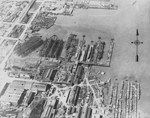
0814300 |
7.80k |
Union Iron Works, San Francisco, California.
Photographed during World War I, with four-piper destroyers under construction at the Risdon Iron Works in the lower right. Four submarines and one destroyer hull in dry-dock are at the piers in the center, along with some large merchant ships. Risdon, part of Union, is to the lower right of the ink line. 1-Cafeteria, 2-Store room, 3-Iron Foundry, 4-Brass Foundry, 5-Machine shop, 6-Pattern shop, 7-Erecting machine shop, 8-Administration building, 9-Power house, 10-office bldg., Govt. offices, 11-Blacksmith shop, 12-Bioler shop, 13-Joiner shop, 14-Joiner shop, Annex with oil storage tanks underneath, 15-Warehouse and office bldg., 16-Pipe and copper shop, 17-Steel storage, 18-Plate shop, 19-Gate house, 20-Building slips 4&5, 21-Building slips 1.2 & 3, 22-Wharf #2, 23-Wharf #3, 24-Floating dock, capacity 2000 tons, 25-Floating dock, capacity 6500 tons, 26-Wharf #4, 27-Wharf #5, S-Storage space 2--Risdon Plant shown south and east of red lines: 1-Copper storage, 2- Oil tank, 3-Office building, 4-Office building, 5-Yarrow boiler shop, 6-Warehouse, 7-Power house, 8-Blacksmith shop, 9-Storehouse, 10-Sheet metal shop, 11-Sheet metal shop, 12-Marine machine shop, 13-Wharves, 14-Wharves, 15-Wharves.
Appearing here in no order are vessels that were constructed but not necessarily here:
6 of 27 R-class submarines
first keel laid: R-16 (SS-93), 26 April 1917, last: R-19 (SS-96), 23 June 1917
first launch: R-15 (SS-92), 10 December 1917, last: R-19, 28 January 1918
R-15 (SS-92) ... R-20 (SS-97)
12 of 51 S-class submarines
S-30 (SS-135) ... S-41 (SS-146)
26 of 111 Wickes-class destroyers for the United States Navy between 1917 and 1919
first keel laid: Ringold (DD-89), 20 October 1917, last: Stansbury (DD-180), 9 December 1918
first launch: McKee (DD-87), 23 March 1918, last: Stansbury, 16 May 1919,
8 are launched on 4 July 1918
McKee (DD-87) ... Gridley (DD-92),
Schley (DD-103),
... Ludlow (DD-112),
Burns (DD-171) &
... Stansbury (DD-180)
40 of 156 Clemson-class destroyers for the United States Navy between 1918 and 1921
Chauncey (DD-296) ... Melvin (DD-335)
|
Photo courtesy of history.navy.mil |
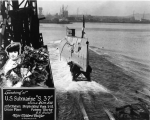 |
151k |
Composite photo marking the launching of S-37 (SS-142), at Bethlehem Shipbuilding Corp, Ltd., Union Plant, Potrero Wks. on 20 June 1919. The ship's sponsor Miss. Mildred Bulger is shown on the left. | USN photo courtesy of ussubvetsofwwii.org. |
 |
113k |
The S-boat was the culmination of E.B. single-hull design for the U.S. Navy. This is a typical unit of the S-30-41 (SS-135-46) group, as completed. Ballast trunks are indicated. Lines below the hull show the location of the fuel tanks forward & aft (the foremost two tanks of the after group are the lubricating oil tank & sump tank). Arrows indicate the two Fessenden oscillators under the boat's keel, fore & aft. Arrows in the bridge structure indicate the three periscopes (one in the conning tower, soon removed) the telescoping radio mast & the radio tube leading down into the radio room.
In the control room the wheels controlling the planes were on the port side: the three levers for the Kingston valves were on the opposite side, abaft the chart table. The radio room, (below the radio tube, into which the antenna leads ran) was set into the after port side of the control room.
Abaft the main motors were ancillaries: the low pressure main ballast pump on the centerline, the high pressure main ballast pump on the starboard shaft, the motor for the Fessenden oscillator on the port shaft.
|
Drawing & Text courtesy of U.S. Submarines Through 1945, An Illustrated Design History by Norman Friedman. Naval Institute Press.
|
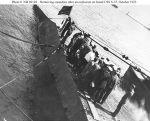 |
121k |
S-37 (SS-142) crew members bringing bodies up through the submarine's after hatch, following an explosion on board that killed three sailors and injured five others on the night of 10 October 1923. At the time of the accident S-37 was moored alongside Beaver (AS-5) at Los Angeles, CA. |
USN photo # NH 69128, Courtesy of the San Francisco Maritime Museum, San Francisco, CA., 1969. |
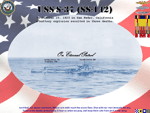 |
201k |
Commemorative photo honoring the memory of the crew of the S-37 (SS-142), 10 October 1923. |
Photo courtesy of Raymond Fritz. ET1(SS). |
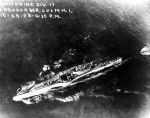 |
218k |
S-37 (SS-142), exercising as part of Submarine Division 17 at Apra Harbor, Guam M.I. on 29 October 1924.
| USN photo courtesy of ussubvetsofwwii.org. |
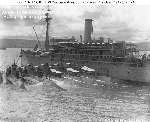 |
85k |
Canopus (AS-9) in Apra Harbor, Guam, with Submarine Division 17 alongside, 29 October 1924.
Submarine Division 17's members were:
S-36 (SS-141),
S-37 (SS-142);
S-38(SS-143);
S-39 (SS-144);
S-40 (SS-145) and
S-41 (SS-146).
| USN photo # NH 55048, from the collections of the US Naval Historical Center. |
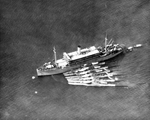 |
76k |
Canopus (AS-9), in Apra Harbor, Guam, 29 October 1924, with all six members of Submarine Division 17 alongside.
The division consisted of:
S-36 (SS-141);
S-37 (SS-142),
S-38 (SS-143),
S-39 (SS-144),
S-40 (SS-145) and
S-41 (SS-146).
|
USNHC photograph # NH 104940. |
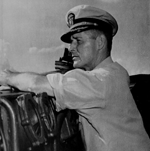 |
118k |
Vice Admiral Vincent Raphael Murphy was the commanding officer of the submarine O-11 (SS-72) from 1929 to 1932. He also served aboard the submarines S-37 (SS-142) from 1924 to 1927; S-11 (SS-116) from 1929 to 1932 and the Texas (BB-35) from 1935 to 1937. The picture was taken when he was the commanding officer of the battleship Alabama (BB-60) in 1944.
|
Photo from the War Diary USS Alabama 1942 - 1944 courtesy of Bill Gonyo. |

0814312 |
606k |
Canopus (AS-9) at Naval Station Olongapo, Philippine Islands, circa 1926 with from outboard to inboard:
S-36 (SS-141)
S-38 (SS-143)
S-37 (SS-142)
S-41 (SS-146)
S-39 (SS-144) alongside. |
From Hyman Fischer photo album via Sandie Larsen courtesy of Don Kehn, Jr. & Gary Priolo. |
 |
95k |
The boats of Submarine Division Seventeen (SubDiv 17), US Asiatic Fleet, moored alongside Canopus (AS-9) at Tsingtao, China, circa 1930. Identifiable submarines present include S-36 (SS-141), S-39 (SS-144), S-37 (SS-142) and S-41 (SS-146). Note sailors relaxing on deck, Chinese men on board the submarines,
and 4"/50 deck guns.
| USN photo # NH 59968, from the collections of the US Naval Historical Center. |
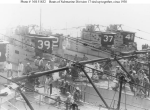 |
88k |
The boats of SubDiv 17, Asiatic Fleet, moored alongside Canopus
(AS-9) at Tsingtao, China, circa 1930. Identifiable submarines present include S-39 (SS-144),
S-37 (SS-142) and S-41 (SS-146). The boat closest to the camera is probably S-36 (SS-141). Note SubDiv 17 insignia painted on conning towers.
| USN photo # NH 51832, from the collections of the US Naval Historical Center. |
 |
196k |
S-36 (SS-141) at anchor, moored alongside Canopus
(AS-9), probably at Tsingtao, China, circa 1930 with the rest of the boats of Submarine Division Seventeen (SubDiv 17). The other S-boats are probably S-37 (SS-142), S-38 (SS-143), S-39 (SS-144).
Note all the washing hung out to dry on the signal lines.
| Courtesy of ussubvetsofworldwarii.org. |
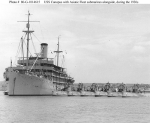 |
64k |
Canopus (AS-9), with the Asiatic Fleet's Submarine Squadron Five alongside, during the 1930s. The submarines present include (from left to right): S-37
(SS-142); S-40 (SS-145); S-36 (SS-141); S-38
(SS-143); S-41 (SS-146); S-39 (SS-144). |
US National Archives photo # 80-G-1014615, a USN photograph, now in the collections of the National Archives. |
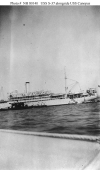 |
78k |
Canopus (AS-9) at Tsingtao, China, circa 1933-1934, with "S-Boats " of Submarine Squadron Five alongside. Outboard submarine is S-37 (SS-142). |
USN photo # NH 80140, Courtesy G.K. Bishop, USAF, 1974., from the collections of the US Naval Historical Center. |
 |
68k |
Boats of SubRon 5 at Olongapo, Philippine Islands, circa 1933-1934.Submarines present are S-37 (SS-142), S-38 (SS-143), S-39 (SS-144) and S-40 (SS-145). |
USN photo # NH 80142, Courtesy G.K. Bishop, USAF, 1974, from the collections of the US Naval Historical Center. |
 |
414k |
S-37 (SS-142), probably circa 1930's.
| USN photo courtesy of Ed Zajkowski. |
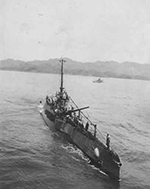 |
95k |
Circa 1930's S-37 (SS-142) photo.
| USN photo courtesy of Ken Lusk. |

0814209 | 2.41k |
On 2 February 1942, S-37 (SS-142) under the command of James C. Dempsey, departed Soerabaja and headed back to Makassar Strait...and on the evening of the 8th, she sighted a destroyer, which was thought to be an advance guard unit for enemy forces en route to that city....At 1800, the destroyer, allowed to pass unmolested, disappeared to the northwest. Thirteen minutes later, the mast and upper works of three destroyers in column were sighted: distance 5 miles, estimated speed --15 knots.
A half-hour's wait brought no transports or cargomen into view, and S-37 went after the destroyer formation. Moving on the surface, she closed the destroyers, all four in column, distance 8,000 yards. All torpedoes were readied; and, at 1946, she commenced her approach. A minute later, she sighted another closer, formation of four destroyers, distance 4,000 yards, plus the dim outlines of three large ships resembling transports, distance three miles, on a northerly course.
At 1951, S-37 changed course to go after the transports. By 2010, however, the destroyers to the submarine's starboard had increased speed to maintain cover for the transports as the formation turned and crossed ahead of the submarine at 4,000 yards. By 2030, S-37, unable to gain an unimpaired shot at the transports, shifted to attack the destroyers. Between 2036 and 2040, she fired one torpedo at each destroyer. Thirty seconds after firing the third torpedo, she observed a hit between the stacks of the third destroyer, and, as black smoke rose, the destroyer buckled in the middle and the mid-ship portion rose approximately 20 feet above the bow and stern. Natsushio, a Kagero class DD, was going down 22 miles south of Makassar, Celebes (05-10 S, 119-24 E). First of 39 Japanese destroyers to fall victim to U.S. submarines during the war.
| Text courtesy of DANFS.
Natsushio sinking partial text via combinedfleet.com
Photo courtesy of wikimedia.org.
Dempsey photo via wikipedia.org |
 |
45k |
In April 1942, S-37 (SS-142) continued on to Brisbane where she joined Task Force 42 and, after an extensive overhaul, departed for her fifth war patrol. Clearing Moreton Bay on 22 June, she was in the Bismarcks by the end of the month, and, after patrolling in St. George Channel, she moved toward New Hanover. On 7 July, she shifted back to the New Britain coast to patrol in the Lambert Point area. There, on the afternoon of the eighth, she sighted a Japanese merchantman escorted by a submarine chaser. Closing the target, she fired three torpedoes at 1405. Three explosions followed, sinking the 2,776-ton Tenzan Maru. |
Text courtesy of DANFS.
Photo courtesy of wrecksite.eu. |
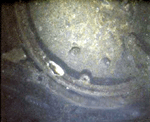 |
65k |
One of the S-37's (SS-142) torpedo doors underwater. | Photo courtesy of cawreckdivers.org. |
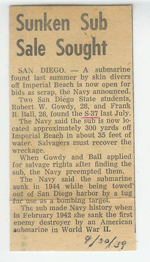 |
73k |
S-37 (SS-142) makes the news: Navy Times, 30 September 1959 & Chr. Science Monitor 16 June 1965 | Photo courtesy of Ron Reeves (of blessed memory). |
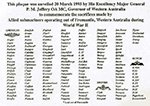 |
365k |
This plaque was unveiled 20 March 1995 by His Excellency Major General P.M. Jeffery OA MC, Governor of Western Australia to commemorate the sacrifices made by Allied submarines that operated out of Fremantle, Western Australia during WW II. |
Photo courtesy of Ron Reeves (of blessed memory).
|






















